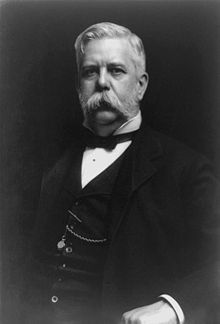George Westinghouse
George Westinghouse, Jr. was an American entrepreneur and engineer who invented the railway air brake and was a pioneer of the electrical industry, gaining his first patent at the age of 22. Based in Pittsburgh, Pennsylvania for much of his career, Westinghouse was one of Thomas Edisons main rivals in the early implementation of the American electricity system. Westinghouses electricity distribution system, based on alternating current, ultimately prevailed over Edisons insistence on direct current. In 1911 Westinghouse received the AIEEs Edison Medal For meritorious achievement in connection with the development of the alternating current system.
George Westinghouse was born in 1846 in Central Bridge, New York, the son of Emeline and George Westinghouse, Sr., a machine shop owner. From his youth, he was talented at machinery and business. At the age of fifteen, as the Civil War broke out, Westinghouse enlisted in the New York National Guard and served until his parents urged him to return home. In April 1863 he persuaded his parents to allow him to reenlist, whereupon he joined Company M of the 16th New York Cavalry and earned promotion to the rank of corporal. In December 1864 he resigned from the Army to join the Navy, serving as Acting Third Assistant Engineer on the gunboat USS Muscoota through the end of the war. After his military discharge in August 1865, he returned to his family in Schenectady and enrolled at Union College. However, he lost interest in the curriculum and dropped out in his first term there.
Source: Wikipedia

